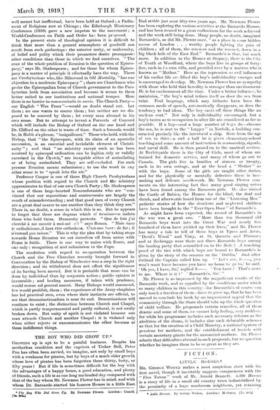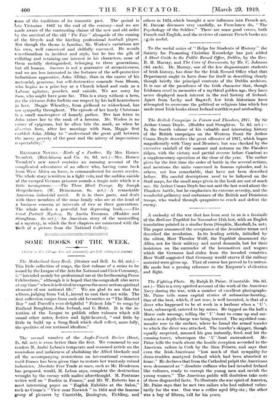FICTION.
LITTLE .11OUSES.•
MR. GEORGE Wonep makes a most auspicious start with his first novel, though it inevitably suggests comparisons with the " Five Towns " work of Mr. Arnold Kennett. Little Houeee is a story of life in a small old country town industrialized by the proximity of a huge mushroom neighbour, yet retaining • balk Rouses. By George wide. Loudon: Methuen. 17s. uotd sonic of the traditions of ita romantic past. The period is late Victorian-1882 to the end of the century—and we are made aware of the contrasting claims of the new and old order by the survival of the old "Pie Fair" alongside of the coming of the bicycle and the hireling professional football player. But though the theme is familiar, Mr. Woden's -variations are his own, well conceived and skilfully executed. He avoids sensationalism in incident and style, but he has the gift of enlisting and retaining ors• interest in his characters, none of them socially distinguished, belonging to three generations, but all human. Success is not a guarantee of attractiveness, and we are less interested in the fortunes of the self-protective industrious apprentice, John Allday, than in the career of his mercurial, generous, but self-destructive comrade Sam Bloom, who begins as a prize-boy at a Church ',school and ends as a Labour agitator, poacher, and suicide. We are sorry for Sans, who might have gone far. This is a story without a hero, for the virtuous John forfeits our respect by his half-heartedness in love. Maggie Wheatley, from girlhood to widowhood, has our sympathy throughout. The episode of her lonely Christmas is a small masterpiece of homely pathos. Her last letter to Joists raises her to the rank of a heroine. Mr. Woden is no coiner of epigrams, but he often hits the mark, as when he observes how, after her marriage with Sam, Maggie first enabled John Allday to " understand the great gulf between the merry poverty of the poor and the misery of impecunious respectability."



































 Previous page
Previous page